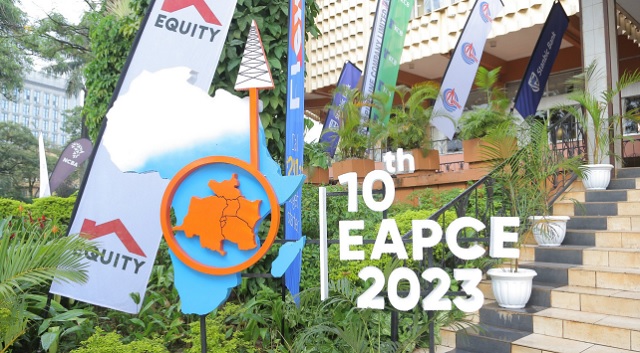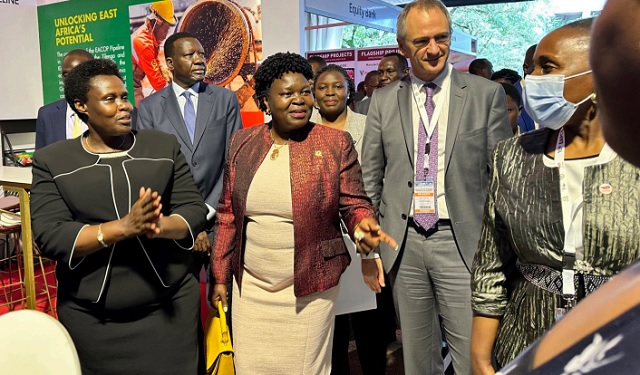
Banks are ready to finance the sector but with stringent conditions
Kampala, Uganda | JULIUS BUSINGE | Uganda’s commercial banks have reiterated their commitment to finance oil and gas projects as long as borrowers meet the terms and conditions.
Bank executives who spoke during the 10th East African Petroleum and Exhibition 2023 conference held in Kampala from May 09 – 11, said borrowers have to be well-positioned and structured in terms of environmental and social governance principles.
KCB Uganda Executive Director, Agnes Mayanja said “Banks are ready to finance the oil and gas sector but the intricacies and complexities of credit access and extension remain.”
Andrew Philip Wabulya, the Executive Director for the Petroleum Investment Fund at the Bank of Uganda said, “We have recently urged commercial banks to increase their capital base and do syndicated borrowing to be able to meet sector demands.”
Wabulya said there is a need for regulators, private sector players, government, and contractors to lower requirements related to access to capital to accommodate potential investors in the sector.
This development comes as lenders remain undecided on financing the US$4bn East African Crude Oil Pipeline citing environmental reasons.
TotalEnergies Uganda General Manager Philippe Groueix said access to international financing is becoming difficult but not impossible for petroleum sector players.
As a solution, Groueix said, African Bank financing should be the alternative – an idea that appeared to be supported by the Minister of Energy and Mineral Development Ruth Nankabirwa.
Nankabirwa said it is not fair for financing institutions to pull out of “our projects when you financed the exploration.
“We are watching financing institutions that are burying their heads in the sand at a time when Africa is fighting energy poverty. I can assure you we shall get the funding needed for the EACOP,” she said.
Peter Muliisa, the head of corporate affairs at Uganda National Oil Company revealed that EACOP would be financed through debt and equity arrangements.
He said that 40% of the pipeline financing will come from oil companies and the remaining financing will come from lenders such as commercial banks.
Environmental & social governance issues
The oil and gas sector is claimed to be responsible for 41% of GHG emissions – 10% generated during production & refining and 90% linked to the use of products.
But a presentation from UNOC during the conference states that the Uganda Refinery will produce clean fuels conforming to EURO-5 / AFRI-6 standards; have a flexible refinery design easily convertible to the refinery of the future, produce petrochemicals that conform to the World Bank and International Finance Corporation Standards.
UNOC says the refinery would also support the country’s energy transition from charcoal and firewood to LPG.
Sector collaboration
Vice President Jessica Alupo, who spoke on behalf of President Yoweri Museveni, said energy is an important and very critical ingredient for the development and growth of any economy including the EAC trading bloc.

“The EAC attaches great significance to cooperation in the exploration and development of energy resources available in our region. Without energy, EAC cannot achieve the intended goals of integration with the aim of achieving economic, social, and political integration so as to create wealth in the region and enhance competitiveness through increased production, trade, and investment in the oil and gas sector,” he said.
He added: “As the EAC partner states, we emphasise cooperation in the joint exploration and development of the energy resources found within the community.”
He said, the EAC as a region is aware of a global push for energy transition, which means moving away from the use of fossil fuels to renewable energy.
“As the way forward, I would like to emphasize that for the East Africa region and Africa in general, we do recognize that the threats posed by climate change are real and we support measures aimed at protecting the environment.”
Museveni said such measures must conform with the “principle of equity and common but differentiated responsibilities and respective capabilities, in the light of different national circumstances” as enshrined in the Paris Climate Agreement as this principle was key in assuaging the fears of developing countries, especially oil and gas producing countries, in the early years of the climate negotiation process.
The push for energy transition is coming at a time when the EAC region has established significant petroleum that can greatly contribute to the economies of the region.
Currently, around 37 international oil and gas companies are licensed to carry out petroleum prospecting in the region.
Museveni said EAC is currently taking steps towards continually improving the business environment by addressing policy, security, legal, and regulatory frameworks in all sectors.
He said the oil and gas sector does not operate in isolation as it enables the development of other enabling infrastructure.
Key facts
• Uganda has made significant discoveries of crude oil in the Albertine Graben totalling 6.5 billion barrels.
• Uganda expects first oil in 2025; Final Investment Decision was reached in February 2022.
• US$15billion to be invested in its development and production. Three massive projects are to be undertaken in this endeavor – Tilenga, Kingfisher, and EACOP. Alongside these three projects are a refinery and a petrochemical-based industrial park.
• Kenya has made commercial volumes of crude oil in the Eastern arm of the East African Rift Valley. More areas were marked out for exploration, including in the Indian Ocean.
• Tanzania has made significant discoveries of natural resources, has commercialized part of it, and is currently negotiating what is likely to be a huge investment in the development of this resource. It is also conducting on-shore explorations.
• South Sudan is an established producer with the potential to increase its production.
• DRC sees potential in Albertine Graben as well.
• Licensing and exploration for oil and gas continue in the EAC community
 The Independent Uganda: You get the Truth we Pay the Price
The Independent Uganda: You get the Truth we Pay the Price



